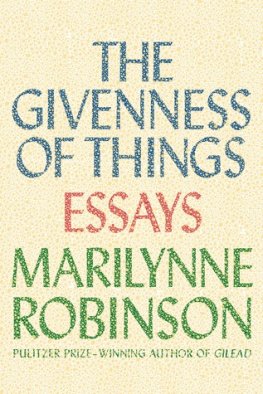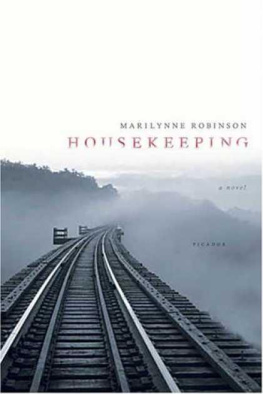A Political Companion
to
Marilynne Robinson
A POLITICAL COMPANION TO
Marilynne Robinson
EDITED BY
Shannon L. Mariotti
AND
Joseph H. Lane Jr.
Due to variations in the technical specifications of different electronic reading devices, some elements of this ebook may not appear as they do in the print edition. Readers are encouraged to experiment with user settings for optimum results.
Copyright 2016 by The University Press of Kentucky
Scholarly publisher for the Commonwealth,
serving Bellarmine University, Berea College, Centre College of Kentucky, Eastern Kentucky University, The Filson Historical Society, Georgetown College, Kentucky Historical Society, Kentucky State University, Morehead State University, Murray State University, Northern Kentucky University, Transylvania University, University of Kentucky, University of Louisville, and Western Kentucky University.
All rights reserved.
Editorial and Sales Offices: The University Press of Kentucky
663 South Limestone Street, Lexington, Kentucky 40508-4008
www.kentuckypress.com
Cataloging-in-Publication data is available from the Library of Congress.
ISBN 978-0-8131-6776-3 (hardcover : alk. paper)
ISBN 978-0-8131-6778-7 (epub)
ISBN 978-0-8131-6777-0 (pdf)
This book is printed on acid-free paper meeting
the requirements of the American National Standard
for Permanence in Paper for Printed Library Materials.
Manufactured in the United States of America.
| Member of the Association of
American University Presses |
Contents
Patrick J. Deneen
Shannon L. Mariotti and Joseph H. Lane Jr.
Shannon L. Mariotti
Joseph H. Lane Jr.
Alex Zamalin and Daniel Skinner
Emily C. Nacol
Lorraine Krall McCrary
Matthew Scherer
Christie L. Maloyed
Ralph C. Hancock
Anna Hadfield and Roger Berkowitz
Shannon L. Mariotti and Joseph H. Lane Jr.
Series Foreword
Those who undertake a study of American political thought must attend to the great theorists, philosophers, and essayists. Such a study is incomplete, however, if it neglects American literature, one of the greatest repositories of the nations political thought and teachings.
Americas literature is distinctive because it is, above all, intended for a democratic citizenry. In contrast to eras when an author would aim to inform or influence a select aristocratic audience, in democratic times, public influence and education must resonate with a more expansive, less leisured, and diverse audience to be effective. The great works of Americas literary tradition are the natural locus of democratic political teaching. Invoking the interest and attention of citizens through the pleasures afforded by the literary form, many of Americas great thinkers sought to forge a democratic public philosophy with subtle and often challenging teachings that unfolded in narrative, plot, and character development. Perhaps more than any other nations literary tradition, American literature is ineluctably politicalshaped by democracy as much as it has in turn shaped democracy.
The Political Companions to Great American Authors series highlights the teachings of the great authors in Americas literary and belletristic tradition. An astute political interpretation of Americas literary tradition requires careful, patient, and attentive readers who approach the text with a view to understanding its underlying messages about citizenship and democracy. Essayists in this series approach the classic texts not with a hermeneutics of suspicion but with the curiosity of fellow citizens who believe that the great authors have something of value to teach their readers. The series brings together essays from varied approaches and viewpoints for the common purpose of elucidating the political teachings of the nations greatest authors for those seeking a better understanding of American democracy.
Patrick J. Deneen
Series Editor
INTRODUCTION
The Mystery of Experience: Marilynne Robinsons Political Theory
Shannon L. Mariotti and Joseph H. Lane Jr.
Something about Marilynne Robinsons voice seems so authentic as to be alien. In her fiction, her characters, towns, homes, and their happenings are so real, so grounded, so true, and so slowly, quietly, and beautifully ordinary that they seem to come to us from a different time and place. And the thinkers, themes, and topics she writes about in her essays have an honestly unfashionable quality to them. Even when she is writing about contemporary problems, as she very often does, her voice seems to come from another century, perhaps the nineteenth century, a touchstone for her thought. But the valuable experience of estrangement and alienation that we have when reading her is only because our own time is so unreal, so rushed, so breathlessly exuberant, where everything is extraordinary and also plastic, inflated, and ultimately empty. It is only a sad commentary on the state of things today that Robinsons writings seem to come to us from another planet. Her voice is wholly her own and immediately identifiable. No one else writes as vividly and convincingly from a place we inhabited before we became whatever we are now. But that is still the place that Robinsons voice comes from.
In her fiction and nonfiction essays, Marilynne Robinson speaks in this unassumingly iconoclastic voice to subtly weave together a consistent set of principles and practices. When drawn out and drawn together, they offer us what is, in essence, a political philosophy or a political theory: a sustained meditation on the problem of how we should live our individual lives and how we should live together with others. When surfaces are excavated, when depths are plumbed, her fiction and her essays give evidence of a core that we can piece together to articulate an ethos, a sensibility, a way of being in the world, that contains lessons for how to experience the world around us and how to approach each other with due reverence.
It might seem somewhat vulgar, though, to call what Robinson offers a political theory, because her writings only rarely advocate for any conventional politics in a direct fashion and her unique constellation of beliefs, values, and advocacies dont fit into our usual categories of Republican or Democratic, red or blue, conservative or liberal. Indeed, that is the nature and that is the value of the unconventional philosophy her works embody and encourage. Her political theory, because that is what it is even if the label jars a bit, is communicated not by preaching lessons or giving advice, but just by showing, again and again, through the experiences of her characters and through the themes of her essays, the value of a particular kind of courage that is so difficult to achieve: the courage it takes to make ourselves vulnerable by facing the challenges and uncertainties of our ordinary lives with a spirit of open-mindedness and attentive perception to what our own eyes see and what our own ears hear and to grant the same respect to the experience of other humans. Like Emmanuel Levinas, Robinson takes seriously the idea that every other human being makes a legitimate claim on us and demands our consideration and respect. The unlikely heroes of Robinsons writingscharacters like Sylvie and John Amesenact her understanding of this democratic ethos. Through them and in her essays, she traces the value of an attitude of receptivity, a capacity to experience the world around us directly without the filters of conventional categories and dualisms, and an ability to recognize the grandeur that everyday ordinary life offers and that everyday ordinary people represent.














